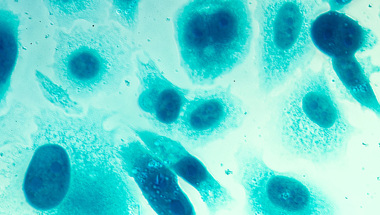Research
17 Feb 2023Knowledge is power: men who know they have family history of prostate cancer more likely to survive it
Thanks to their increased awareness of the risks, men with a family link to prostate cancer may have a better chance of surviving the disease.

Prostate cancer made headlines this week as researchers at the University of East Anglia announced a blood test that could be more than 90 per cent accurate at detecting the disease.
The test is a combination of the existing PSA blood test and another blood test they developed in collaboration with Oxford Biodynamics, called the EpiSwitch test, which looks at how DNA is folded in specific immune cells which might provide tell-tale signs of prostate cancer developing in the body.
The combination, which they called the Prostate Screening EpiSwitch test (PSE test), was correctly able to pick out which men had prostate cancer 92 per cent of the time.
It was also able to correctly identify men who did not have prostate cancer 94 per cent of the time.
The researchers suggest that this accuracy means the new test could one day be useful in screening for prostate cancer among men at high risk of the disease.
But is it likely that this test will be part of routine clinical practice soon?
Increased awareness of prostate cancer
Currently, there is no single test to diagnose prostate cancer. There are a few tests that your GP can do to find out if you have some kind of prostate problem, including a PSA blood test.
However, this is just a first step, as the PSA blood test by itself is not accurate enough to diagnose or screen for prostate cancer. Some men may have a high PSA level but not have prostate cancer, while as many as 1 in 7 men with prostate cancer have a PSA level that is deemed ‘normal’, meaning a PSA blood test alone would miss their cancers entirely.
Given that 10,000 men a year are diagnosed too late for a cure, clearly better tests for prostate cancer are vital if we want to catch the disease early enough to save lives.
That is why we are funding research into better diagnosis and screening.
Although the headline results from this study are promising, the test has so far only been tested in 147 men whose prostate cancer status was already known. Further research is needed to find whether the test can correctly pick out men with prostate cancer – and correctly ignore men who do not – when their diagnosis is unknown.
This step is crucial in working out whether the test could be used for screening men who don’t know if they have prostate cancer.
The test would also need to be trialled on a broad range of men of different ages, ethnicities and family histories, to ensure that it is consistently accurate, and works for as many men as possible.
This will take some time, but if the test is still accurate after more research, it could enable clinicians to find more men with prostate cancer who would otherwise be missed by the current PSA blood test.
It would also help rule out prostate cancer in men who do not have the disease, so they are not sent for a biopsy that they don’t need.
Simon Grieveson, Assistant Director of Research at Prostate Cancer UK, said: "Earlier this year, research revealed that over 10,000 men each year are diagnosed too late, when their prostate cancer is incurable.
“That’s why we welcome promising new research like this into new possible tests which could help diagnose men accurately and at an earlier stage. However, we now need to see this tested in far greater numbers of men before we can determine just how effective this approach could be.
“We desperately need a screening programme for prostate cancer and Prostate Cancer UK is committed to driving the research and evidence required to make screening a reality and to save thousands of men’s lives.”
Our study suggests that men with prostate cancer are much better off knowing about previous cancers in their family.
Knowledge is power
Study leader Professor Ros Eeles, Professor of Oncogenetics at The Institute of Cancer Research, London, and Consultant in Clinical Oncology and Cancer Genetics at The Royal Marsden NHS Foundation Trust, said: “Knowledge really is power. Our study suggests that men with prostate cancer are much better off knowing about previous cancers in their family.
“After looking at the type and timing of patients’ diagnoses, we have concluded that this is likely to be explained by an ‘awareness’ effect, which seems to lead to earlier diagnosis and, as a consequence, better survival.”
Andrew Seggie, 42, who works at Prostate Cancer UK and has a family history of prostate cancer, said: “When my dad was diagnosed at the age of 62 with advanced prostate cancer, it came as a huge shock to the family. He died about 10 months after his diagnosis and receiving treatment to control the cancer. My grandad on my mum’s side was also diagnosed but his was caught early and successfully treated. This means my risk of prostate cancer is almost four times that of men without a family history.
My message to younger men is to talk to your family about prostate cancer, and find out if you have a family history
“My brother and I are now aware of this disease and will be proactive in getting tested when the time comes. If prostate cancer is found, it will hopefully be early enough to be cured.
“My message to younger men is to talk to your family about prostate cancer, and find out if you have a family history. If you do, I strongly recommend you talk to your GP about a regular PSA blood test from the age of 45.”
If you or one of your relatives has been diagnosed with prostate cancer, share the risk checker and have a conversation about prostate cancer with your sons, brothers, uncles and friends. It could save their life.




